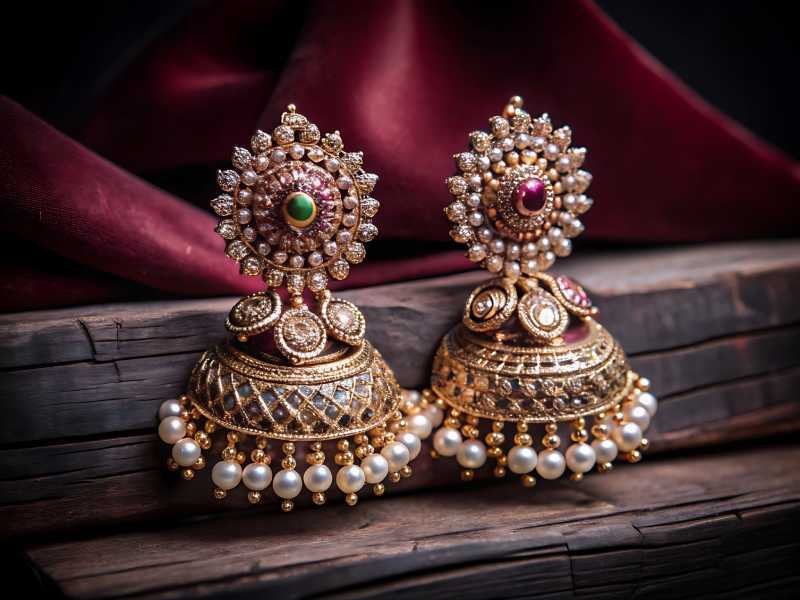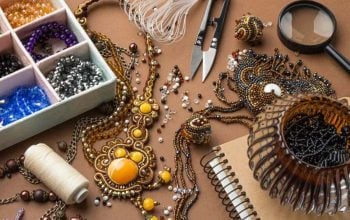Jhumkas, a timeless favorite among women, are intricately designed traditional earrings worn by women for centuries. These classic pairs of jewelry look amazing with not only desi attires but are now globally loved and worn by many women. The bell shape of the earring, often accompanied by a jingling sound, is the key feature of Jhumka. This jingling sound believed to ward off evil spirits, adds to the charm and cultural importance of Jhumkas. These earrings are a testament to the rich cultural history of India. What makes Jhumka even more remarkable is that they never go out of style! They are so versatile and exquisite looking that they have become timeless. There is no single era where we did not see women wearing Jhumka, as it never lost its charm. This elegant pair is seen even on temple statues of goddesses and deities. Created centuries ago, we see women around us as celebrities wearing, adoring, and embracing the beauty and grace of Jhumkas. Let’s dive deeper into the history and evolution of these evergreen earrings.
History of Jhumka
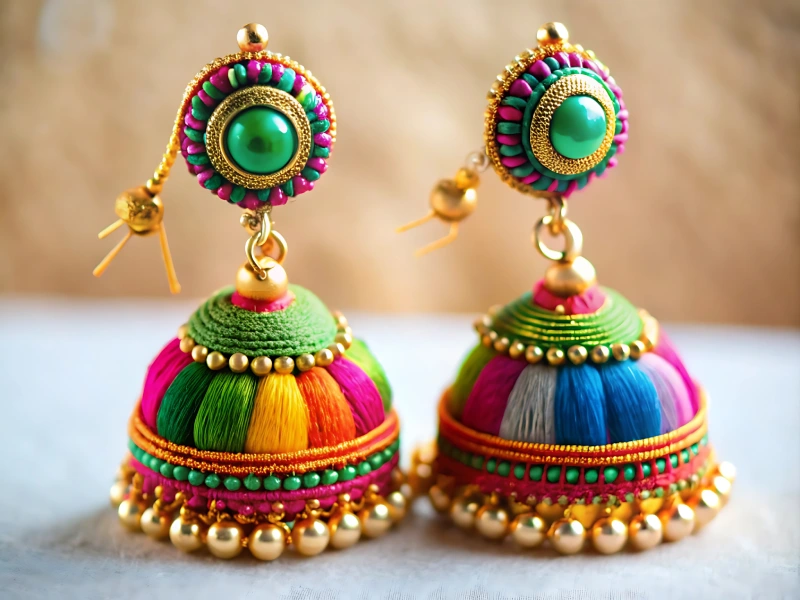
The history of Jhumka, a significant part of Indian heritage, dates back to as early as 300 BCE when statues of deities in the Chola dynasty were seen wearing Jhumka. These bell-shaped beauties were famous among Bharatnatyam dancers in the beginning. The fluidity and the allure of these earrings made them a fantastic choice among dancers in South India. The designs of Jhumkas were inspired by natural elements like flowers and temple art, giving them a unique and timeless appeal. Starting from South India, Jhumka became popular across different parts of the country. They became popular, especially among royal and noble families. They made their designs and added gems and stones. Mughal women started wearing jhumkas every day. Mughals made beautiful variations and additions to their style. One of their famous signature variations in Jhumkas was Kanphool or Kharanphool (ear flower), made of diamonds and pearls. This was often paired with an ornamental chain called Sankali, which was tied to hair via a small hook. Meaning and Symbolism of ‘Jhumka’
Meaning and symbolism of Jhumka
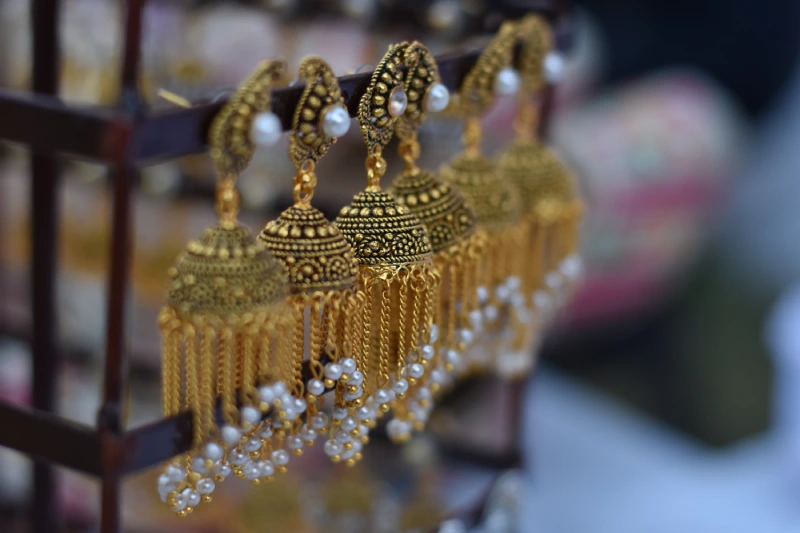
Jhumka, a Hindi word, comes originally from the Sanskrit word ‘Jhumki,’ which translates to ‘little bells.’ Jhumka symbolizes spirituality; its jingling sound is said to bring positive energy and fight negativity. It also represents the encouraging silence of spirituality and eternal life. The bell shape of the jhumka is said to symbolize fertility, prosperity, and abundance. These significant jewelry pieces symbolize grace, elegance, and feminity, adding a touch of sophistication to any attire. They are also symbols of marriage worn by brides at their weddings.
What are jhumkas made of?
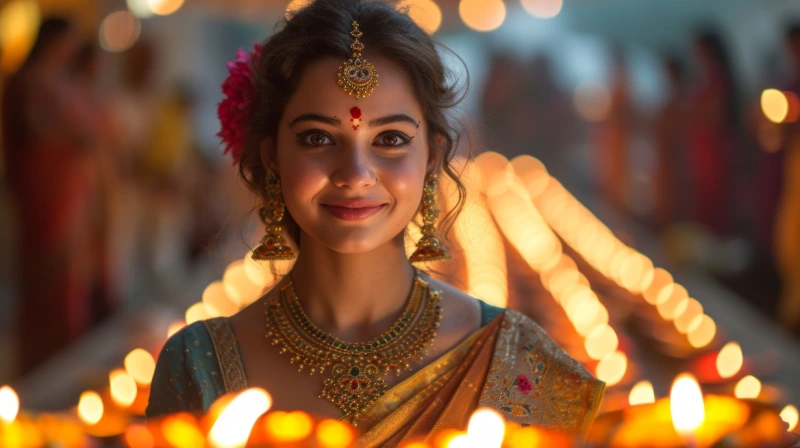
Jhumkas are beautifully designed and crafted from a wide variety of materials, offering a range of options for every taste. They can be made of valuable and expensive metals and gemstones like gold, silver, diamond, pearl, ruby, etc. Some are also made of simple molds and silk threads. Another unique type of jhumka is terracotta jhumka, which is made of earthen clay. The most common and favorite type of jhumkas are oxidized jhumkas made of silver oxide, also known as Gujarati-style jhumkas.
Types of Jhumkas
As of today, we have a wide variety of jhumkas available in the market. These gorgeous accessories are crafted into unique designs. Following are some of the common types of jhumkas:
Meenakari Jhumkas
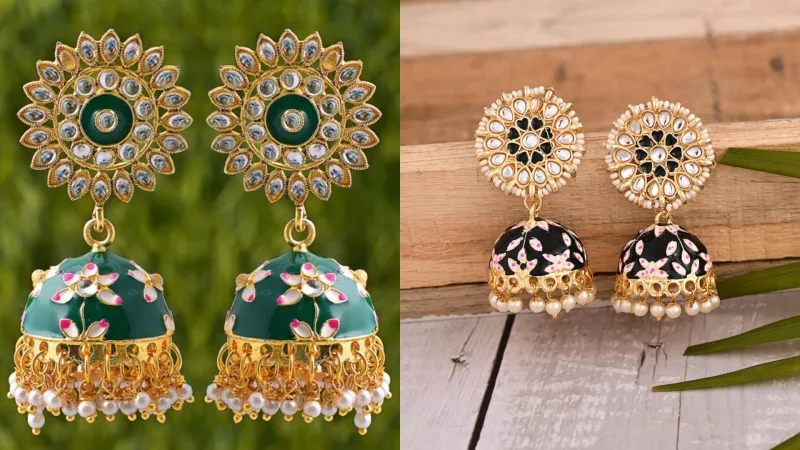
Meenakari Jhumkas are Rajasthani jhumkas. These are known for their vibrant and beautifully jeweled designs, available in various colors. They are known for their colorful appearances and beautiful craftsmanship. You can add more allure to your attire by pairing it with these jhumkas.
Kundan Jhumkas
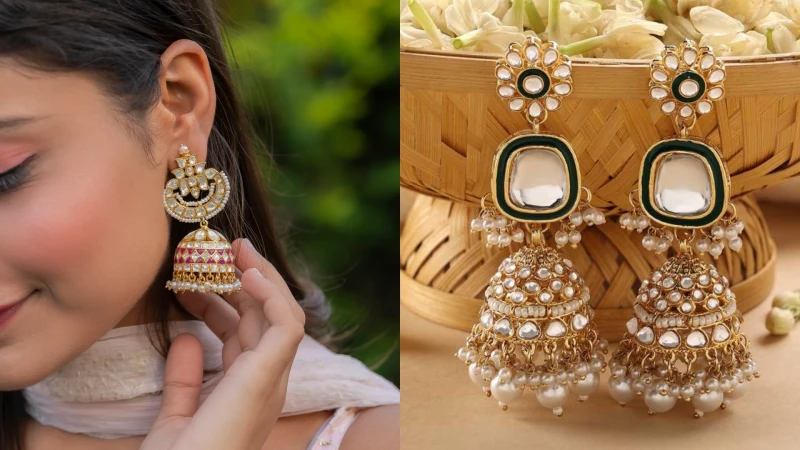
Kundan Jhumkas are made of a special type of stone called Kundan stone. They have a regal and rich look, making them a perfect choice for weddings and big functions.
Hoop Jhumkas
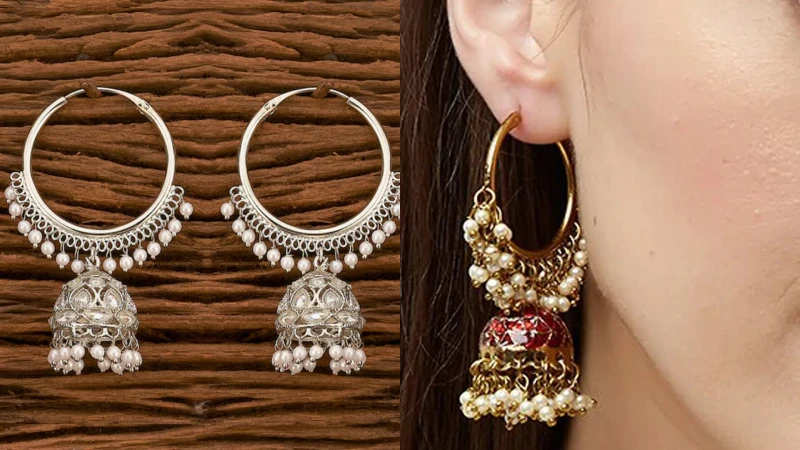
Hoop Jhumkas have hoops and bell-shaped jhumkas at the lower part. This contemporary design, with its unique combination of shapes, looks fantastic on all types of attire and gives the makeover a unique look.
Temple Jhumkas
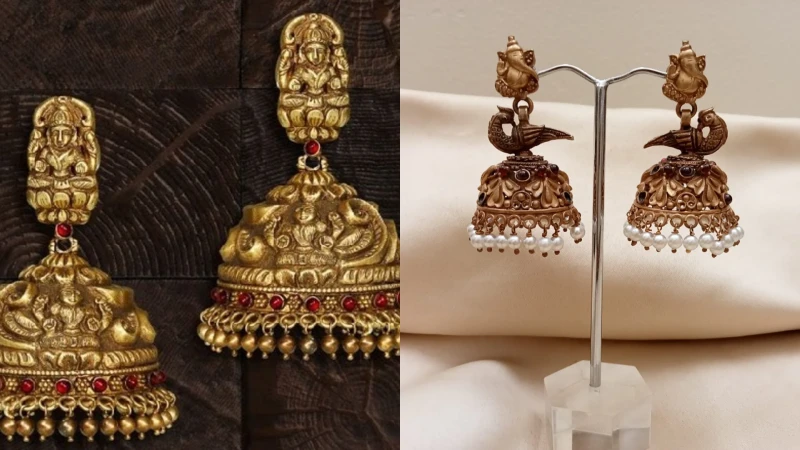
The infrastructure of South Indian temples inspires the design of Temple Jhumkas, which are usually made of gold. These temple jhumkas, with their deep-rooted cultural significance, are a fantastic choice for spiritual events, pooja, and holy ceremonies, connecting you to your heritage.
Chaand Bali Jhumkas
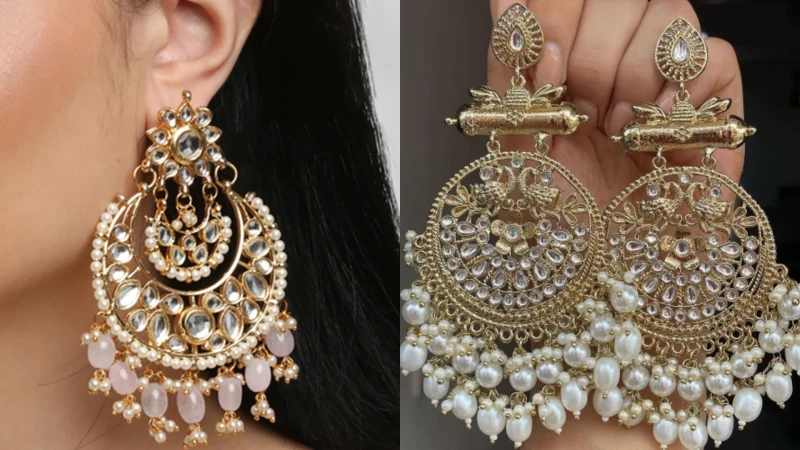
Chaand Bali means moon-shaped earrings. These crescent-shaped jhumkas are beautifully designed and look amazing with heavy traditional attire. They are famous for their versatility.
Suryakanthi Jhumkas
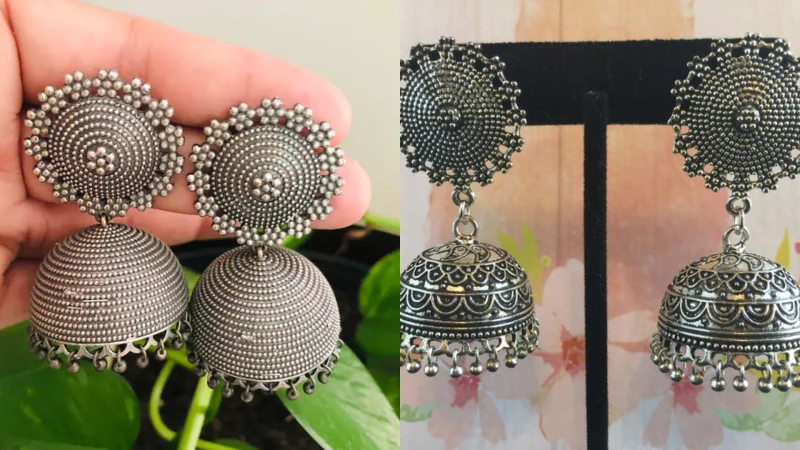
Suryakanthi Jhumkas are sun-inspired jhumkas. They are big, circular earrings with a design similar to the Sun. They look decent yet elegant and are perfect for everyday use. The gold ones are regal-looking and can be worn at parties.
Oxidized Jhumkas
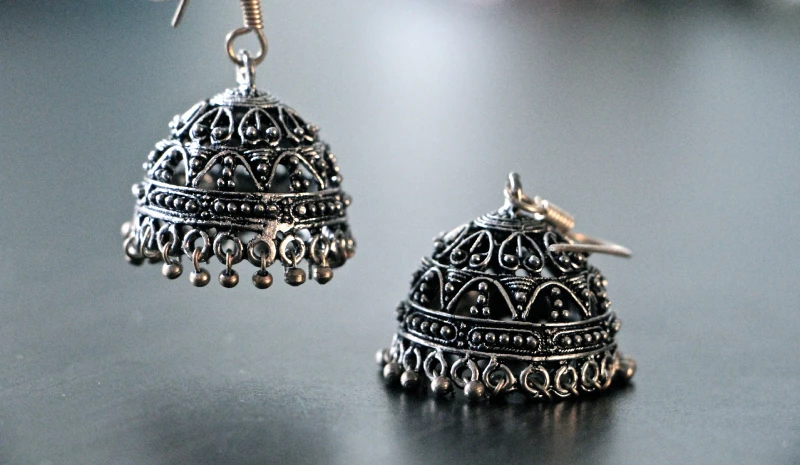
Oxidized Jhumkas, with their versatile style, are perfect for everyday use, formal, casual, contemporary, and traditional styles. Their dark, rusted appearance adds a touch of empowerment and style to your look.
Pearl Jhumkas
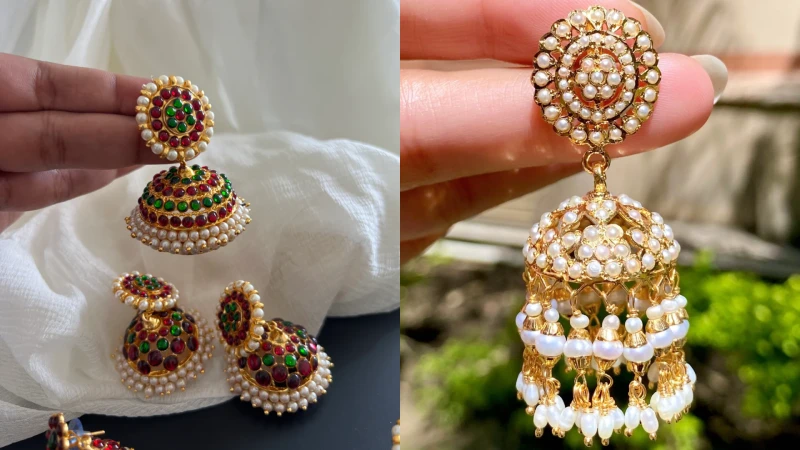
Pearl Jhumkas, with their elegant and graceful design, is a sophisticated choice for any occasion. Made of metals like gold and silver and combined with pearl, they exude refinement and grace.
Kashmiri Jhumkas
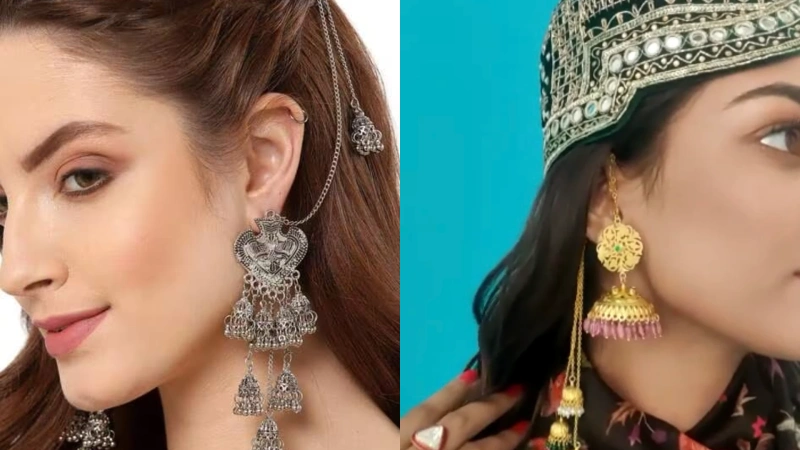
Kashmiri Jhumkas are exquisite and unique traditional jhumkas. Long strings or chains are attached to the jhumka strings, which also extend from the upper part of the jhumka and hang from the back of the ear. This dazzling pair of jhumkas will uplift your outfit and make you look ravishing.
Ear cuff Jhumkas
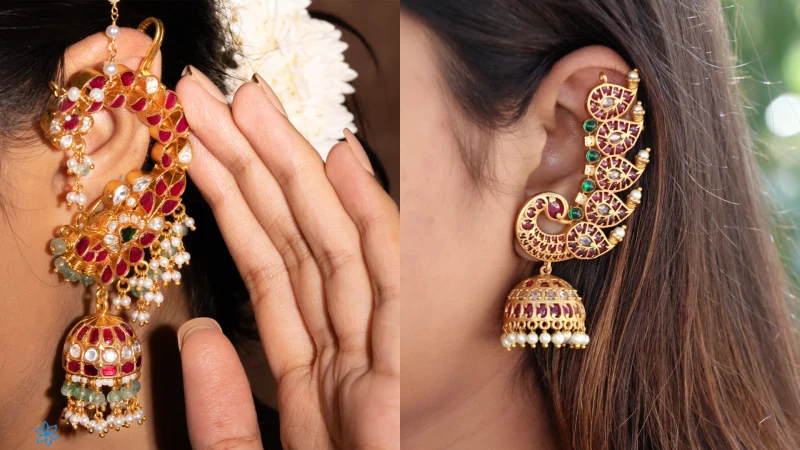
These are modern types of jhumkas, usually inspired by and made from peacock designs. Ear cuffs are attached to jhumkas, and this creative combination creates the most beautiful earrings.
Jhalar Jhumka
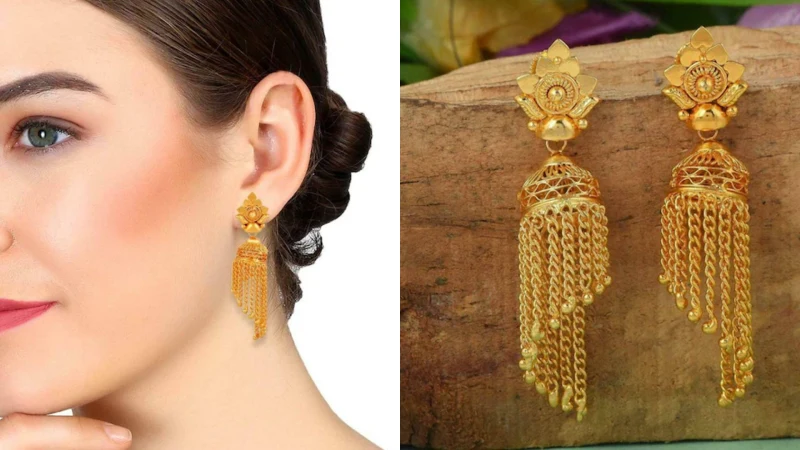
Jhalar Jhumkas are long jhumkas made of attachments of jhumkas descending in size or long frills—a chandelier-looking jhumka. They look perfect with traditional attire and give an overall look that is heavy and rich.
What makes Jhumka a timeless fashion statement?
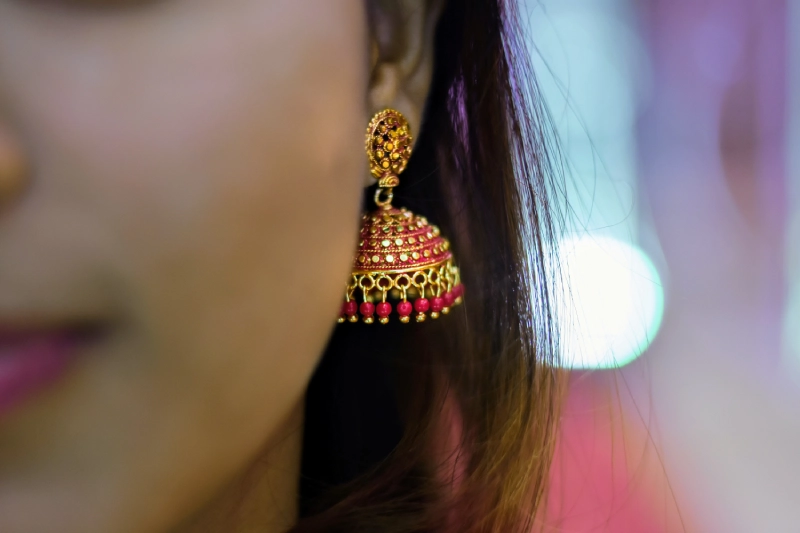
One can never go wrong with jhumkas. Their unique yet striking appearance has made them highly versatile. Initially, jhumkas were used by Bharatnatyam dancers, but as their popularity rose and people became aware of these beautiful earrings, women all over the country started wearing them. Mughals were primarily responsible for the evolution of the jhumkas and their popularity. Now, they are widely available in various designs and types and are made of various materials in all price ranges. From statues of deities in 300 BCE to celebrities flaunting jhumkas with their traditional attire on social media, the charm and elegance of jhumka have forever been the same. They were and are still a significant part of women’s jewelry; without them, any traditional outfit feels incomplete.
Conclusion
Jhumka, an all-time favorite piece of traditional earrings, is a symbol of our cultural heritage, feminity, grace, prosperity, and spirituality. Its versatility is truly inspiring, allowing you to style various types of Jhumkas with a variety of outfits. Whether it’s a heavy saree or lehenga for a grand ceremony, a festival, a party night, or contemporary wear, there’s a Jhumka for every occasion. Their grace and charm are unmatched, adding a creative and elegant touch to any look.

